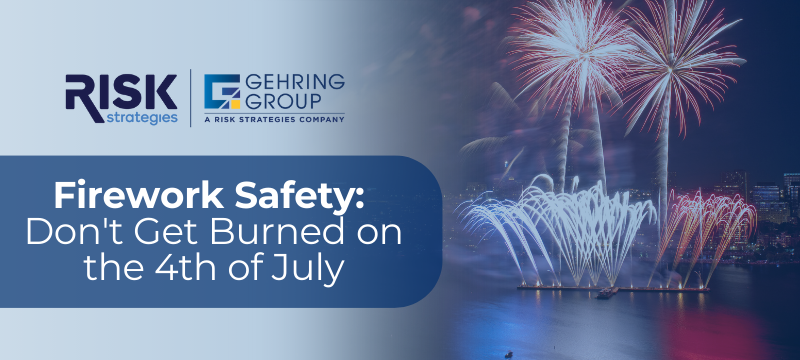
As 4th of July celebrations approach, many people look forward to the excitement and spectacle of fireworks. While fireworks can be a fun and festive way to celebrate, they also pose significant risks to both property and personal safety. Understanding firework safety is essential to prevent accidents and ensure that everyone enjoys the festivities without incident.
Fireworks are inherently dangerous. According to the National Fire Protection Association (NFPA), fireworks start an average of 18,500 fires annually, including 1,300 structure fires, 300 vehicle fires, and nearly 17,000 other fires. These incidents result in direct property damage of about $43 million each year. Additionally, the Consumer Product Safety Commission (CPSC) reports that fireworks cause more than 10,000 injuries annually, many of which require emergency room treatment.
Property Risks
1. Fires: The most significant risk fireworks pose to property is fire. Even small fireworks can cause large fires if not handled properly. This is particularly concerning in areas with dry conditions or near flammable materials such as wood, dry grass, and buildings. Brush fires are occurring with increasing frequency and can be devastating to communities.
2. Damage to Structures: Fireworks can damage homes, garages, and other structures. A stray firework can break windows, damage roofs, and even cause structural fires that can result in total property loss.
3. Vehicle Damage: Vehicles can also be damaged by fireworks. Fireworks can cause dents, scratches, and in some cases, fires that lead to the complete destruction of the vehicle.
Casualty Risks
1. Burns: Burns are the most common firework-related injury. They can range from minor to severe and can affect any part of the body. Hands, fingers, eyes, and the face are particularly vulnerable.
2. Eye Injuries: Fireworks can cause serious eye injuries, including burns, lacerations, and even blindness. According to the American Academy of Ophthalmology, nearly one-third of firework-related injuries are to the eyes.
3. Hearing Damage: The loud noise from fireworks can cause temporary or permanent hearing loss. This risk is especially high for children and pets, who have more sensitive hearing.
4. Trauma: Explosions from fireworks can cause traumatic injuries, including lacerations, fractures, and internal injuries. These injuries often require immediate medical attention and can have long-term consequences. The sights, sounds and smells can also be trauma reminders, especially for veterans. Fireworks may cue memories of combat or explosions.
Firework Safety Tips
1. Follow Local Laws and Regulations: Always check local laws and regulations regarding fireworks. Some areas may have restrictions or bans in place, especially during dry conditions or in high-risk areas.
2. Choose a Safe Location: Set off fireworks in a clear, open area away from homes, vehicles, dry grass, and other flammable materials. Ensure that spectators maintain a safe distance.
3. Have Safety Equipment On Hand: Always have a bucket of water, a hose, and a fire extinguisher nearby when setting off fireworks. In case of a fire, quick action can prevent significant property damage.
4. Supervise Children: Never allow children to handle fireworks. Sparklers, often considered safe, can burn at temperatures of about 2,000 degrees Fahrenheit and can easily cause burns.
5. Use Legal Fireworks: Only use fireworks that are legal in your area. Illegal fireworks are often more powerful and dangerous.
6. Dispose of Fireworks Properly: After fireworks have burned out, douse them with plenty of water before discarding them. This prevents trash fires and reduces the risk of injury.
7. Be Mindful of Pets: Pets are often frightened by fireworks. Keep them indoors and in a safe, quiet area to prevent them from becoming anxious or injured.
Firework safety is crucial in preventing property damage and personal injury. By understanding the risks and taking appropriate precautions, you can ensure a safe and enjoyable celebration. Remember to follow local laws, choose a safe location, supervise children, use legal fireworks, and dispose of them properly. By prioritizing safety, you can enjoy the spectacle of fireworks while protecting both your property and the people around you.
Stay safe and have a happy celebration!
For information on wildfire resources, click here: https://www.risk-strategies.com/insights/emergency-resource-center/wildfire
Check out our other blog articles HERE.